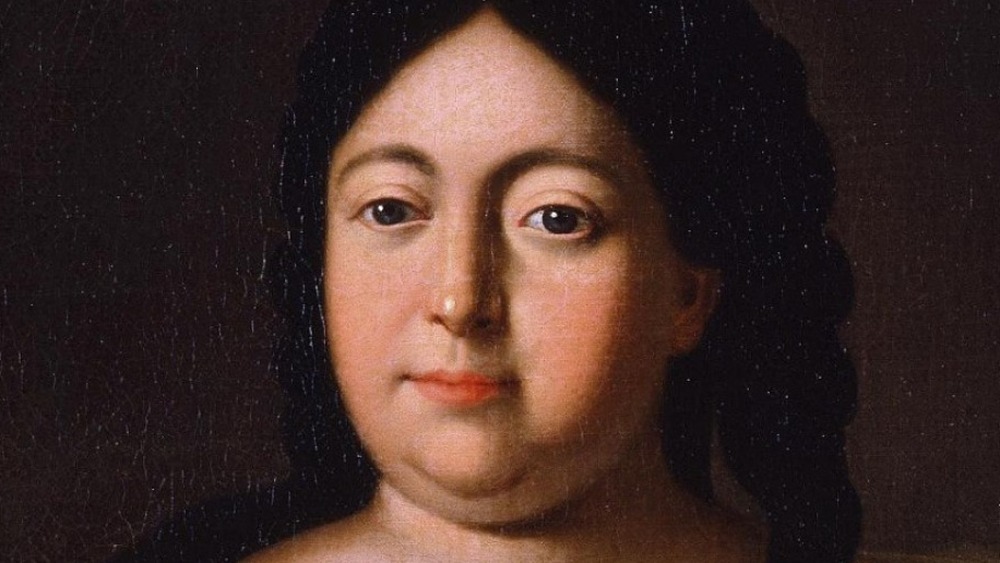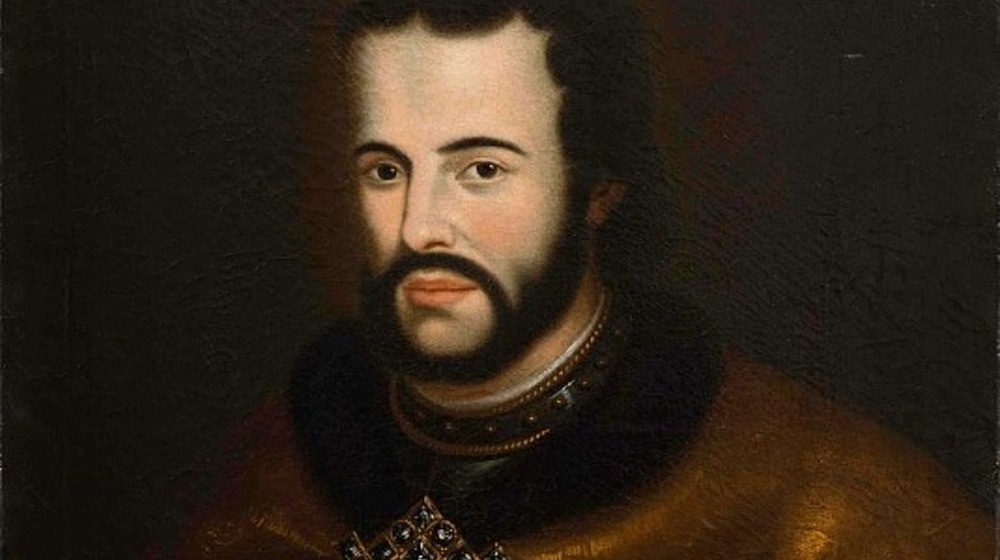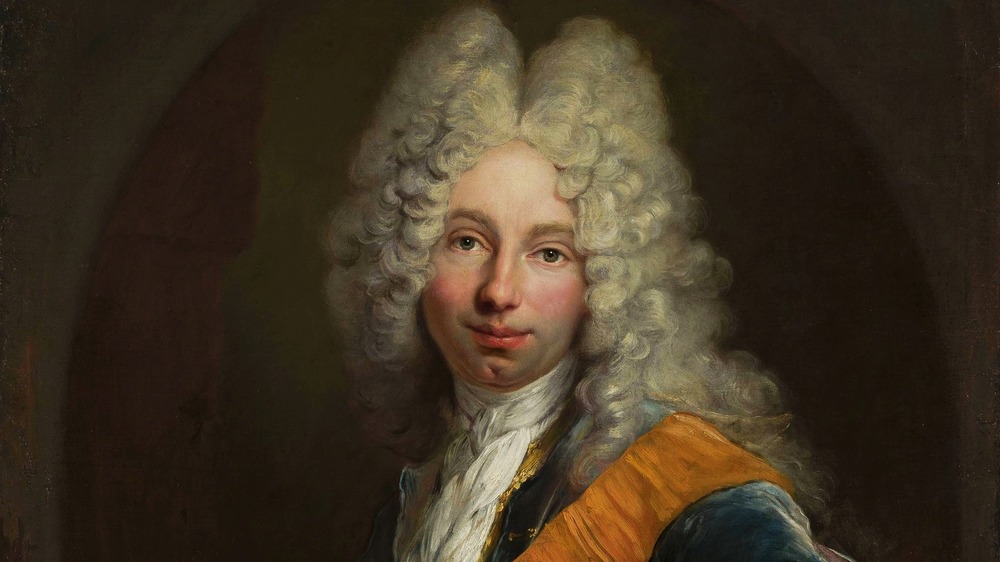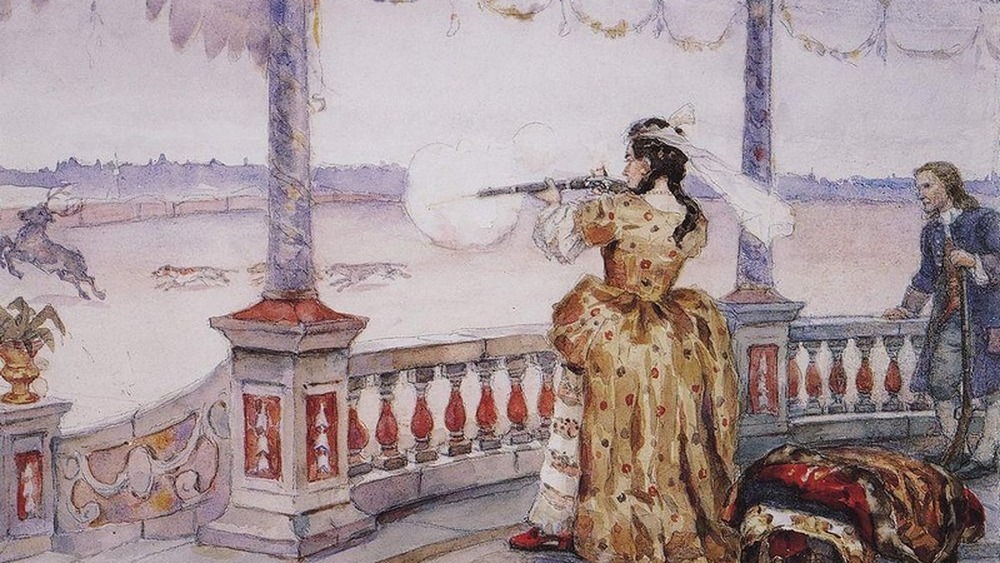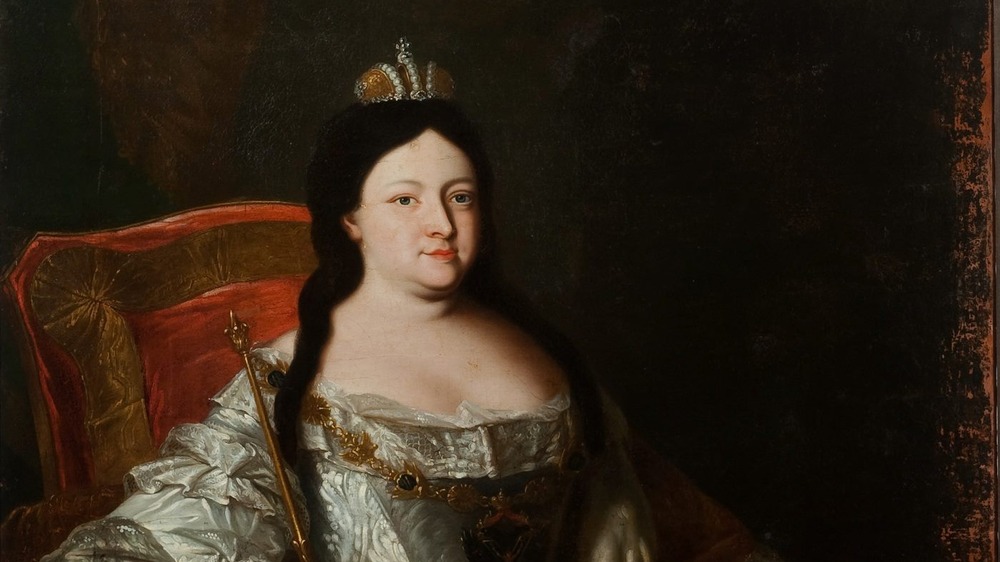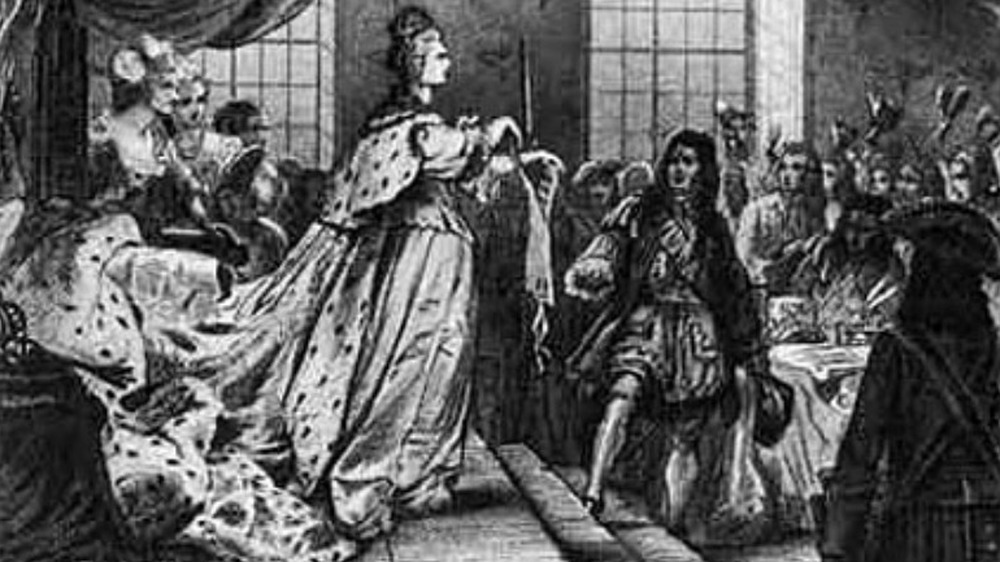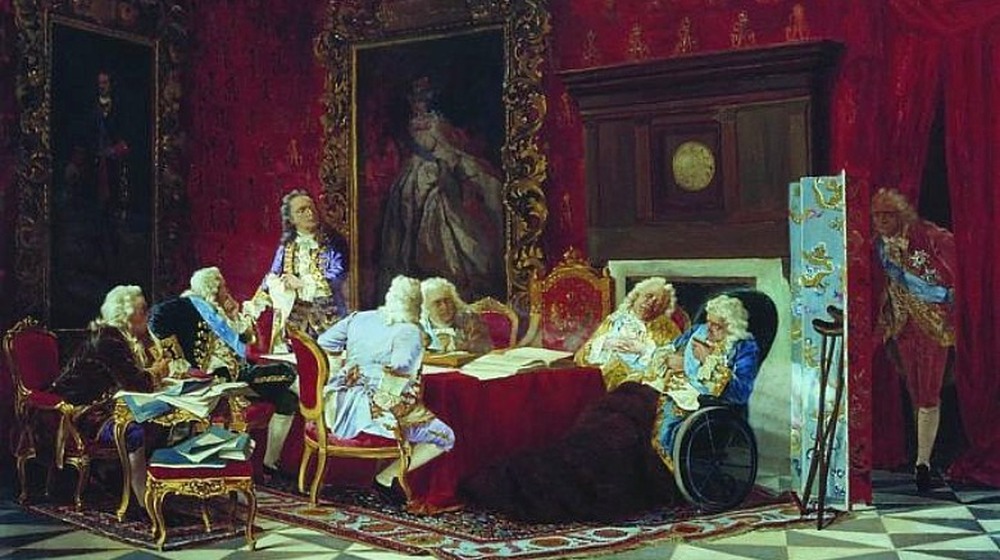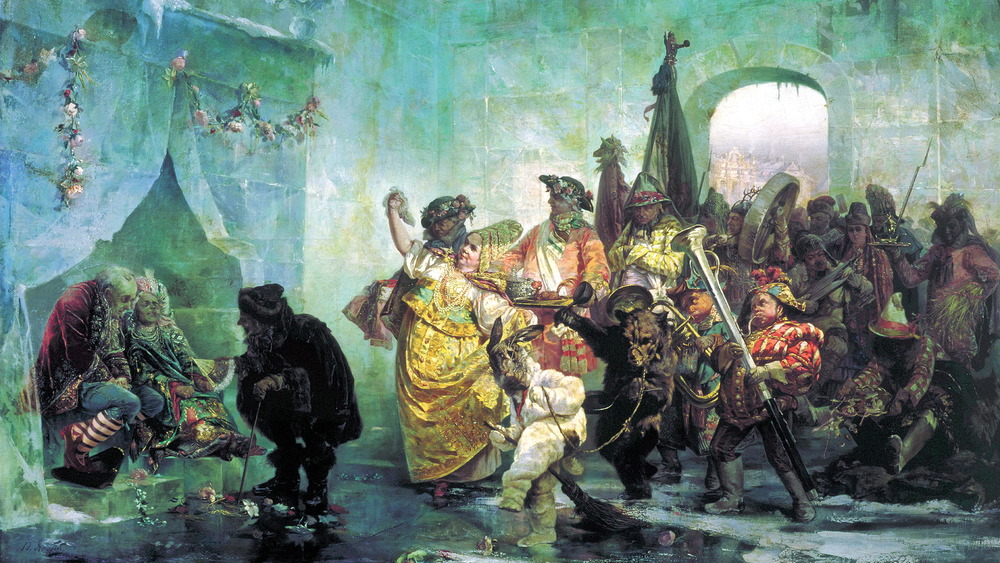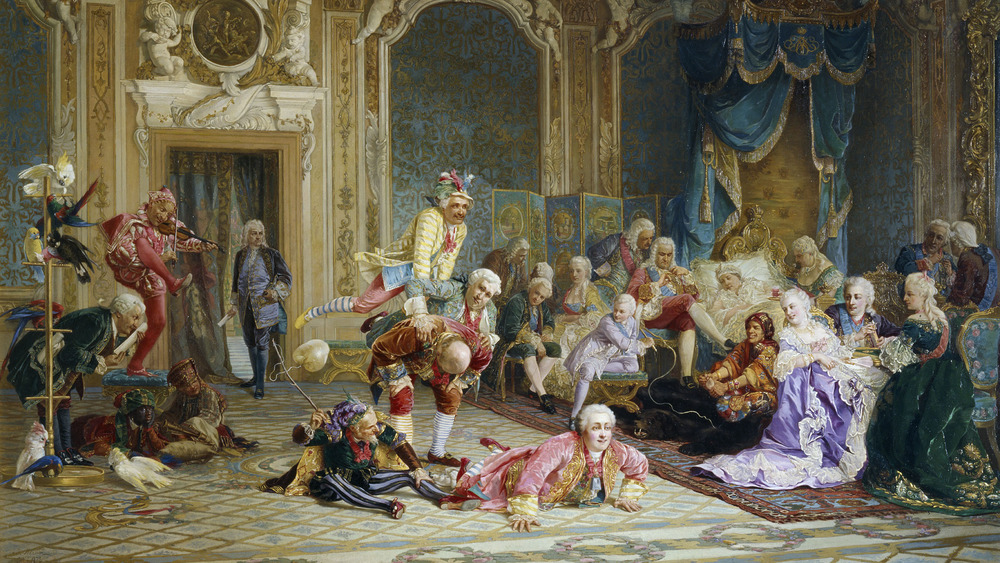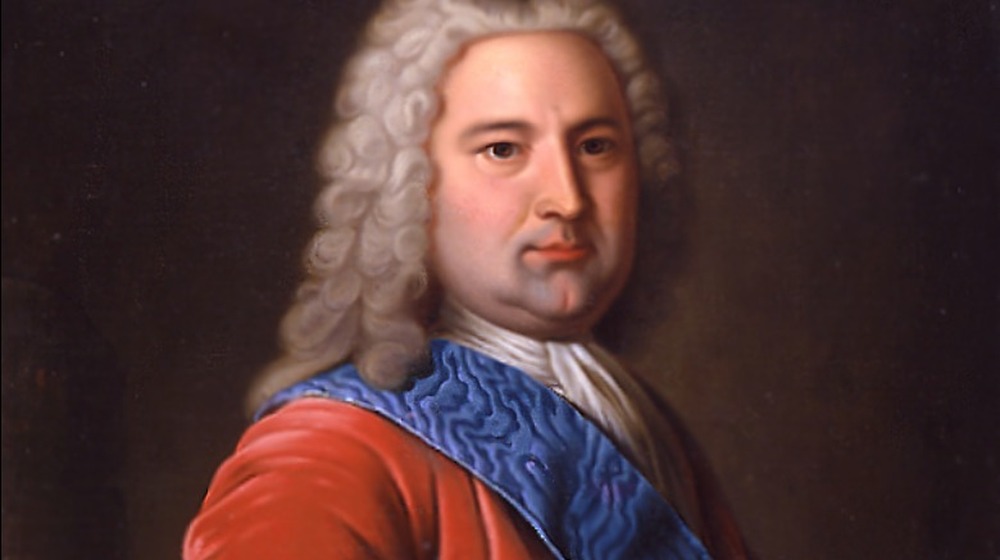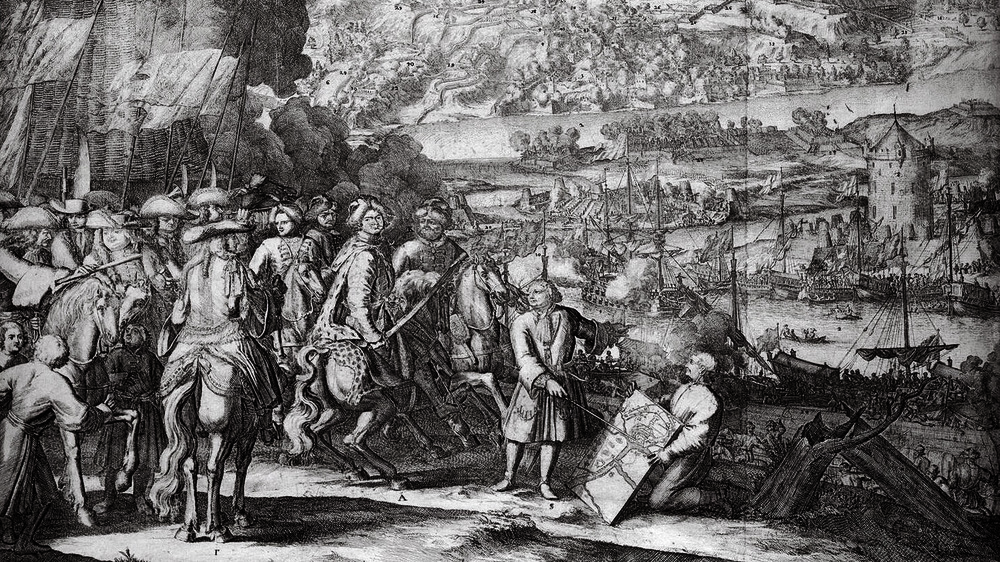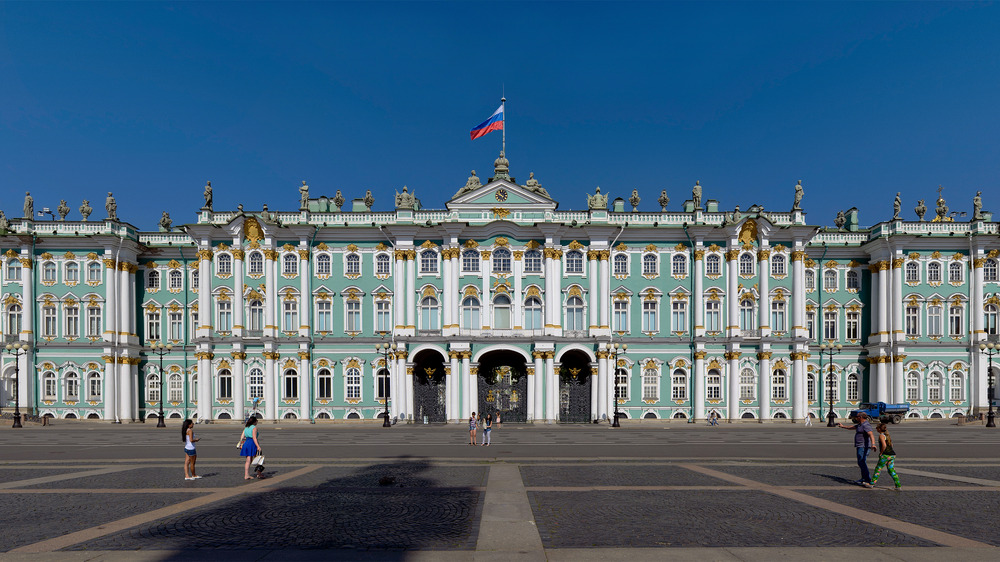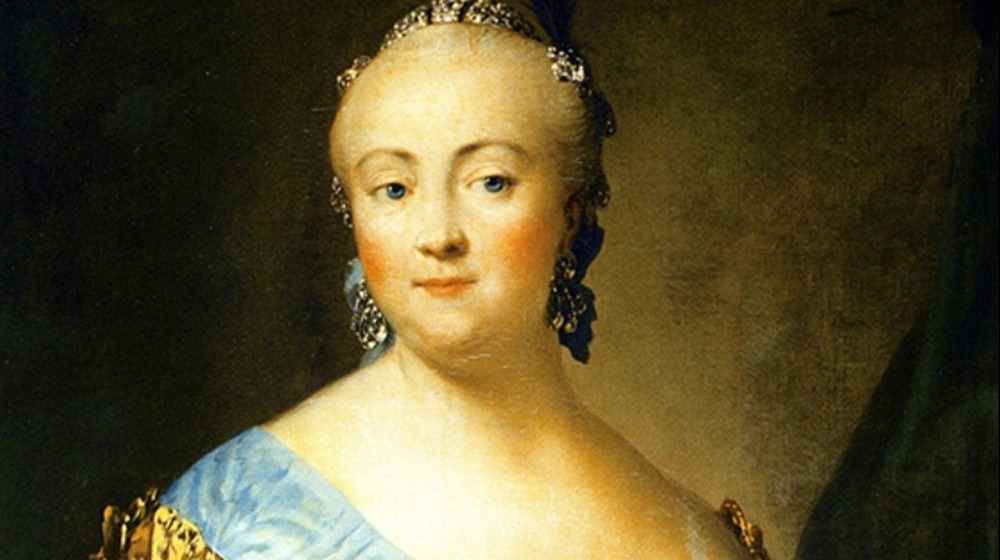The Messed Up Truth About The Empress Who Caused Russia's Dark Age
The Russian Empire had a number of notable tsars and empresses in its time, including Peter the Great, Catherine the Great, and Ivan the Terrible. But one lesser-known monarch of the Russian Empire was a woman who is considered by her own people to have led Russia into a dark age: Anna Ivanovna, the niece of Peter the Great and daughter of Ivan V. But while what would be considered a "dark age" in other places might mean a period of illiteracy, cultural decline, and economic downturn, that's actually the opposite of what happened during Anna's reign.
In fact, while Anna oversaw the continuation and expansion of the progressive policies of Peter the Great, her tenure on the throne is considered a dark era in Russian history strictly because of her cruelty, vulgarity, and bitter, petty personality. Read on to learn some of the messed up actions of Russia's darkest empress.
The birth and childhood of 'Ivanna the Terrible'
Anna Ivanovna's troubled life began in her childhood. You've probably heard of Peter the Great, the Russian emperor famous for bringing Western modernizations to Russia and revolutionizing culture and science for the empire in the early 18th century. Arguably less well-known is his half-brother, known as "Ivan the Ignorant" due to mental and physical disabilities that left him incapable of performing the duties of a tsar most of the time. Anna, born in 1693, was the daughter of Ivan. However, as All That's Interesting explains, Ivan died when Anna was 3-years-old, and Peter became the sole tsar of Russia. Ivan's life and death seem to have had quite the impact on Anna's personality, as she was known for terrible manners, rude behavior, and stubbornness. She was also not thought to be an attractive child: Slate reports that the author Thomas Carlyle said that the young Anna had cheeks like "a Westphalian ham."
Another contributing factor to Anna's unpleasantness was likely the strict atmosphere in which she was raised by her mother. Although Anna's uncle Peter is famous for his progressive ways, her mother held conservative beliefs about how her daughter should be raised, including limiting her education to such a degree that Anna could barely read. All of these things together led to Anna's childhood nickname of "Ivanna the Terrible." Not off to a great start.
Happy marriage, unhappy honeymoon
Despite apparently having ham face and her generally unpleasant personality, Anna was married off by her uncle Peter in 1710 to Frederick William, the Duke of Courland, a region that is now part of Latvia. According to Slate, Anna was beside herself with happiness about her forthcoming nuptials, writing to her betrothed, "I cannot but assure Your Highness that nothing could delight me more than to hear of your declaration of love for me." The wedding was an elaborate affair, with Anna wearing a gold-embroidered cape and bejeweled tiara while fireworks popped off in the background. Two days later, Peter staged a celebratory feast back in Russia for his niece in which a mock version of the wedding was displayed, featuring two dwarfs as parody versions of the bride and groom, presumably as an offensive joke about Anna's reputation for weird looks and off-putting behavior.
At any rate, between the regular wedding and the dwarf remake, Duke Frederick got, like, unreal drunk, even challenging the tsar himself to a foolhardy drinking contest. A few weeks of trying to drink like the tsar in Russia didn't go great for Frederick: whether due to alcohol poisoning, cold weather, or some other illness, Frederick died a mere 20 miles outside of Saint Petersburg on their way back to Courland, leaving Anna a widow and ruler of a country she'd never lived in at age 17.
Anna learns to hate love
Having become a teenage widow so shortly after her wedding, Anna hoped to return home to the court of Peter the Great. As Encyclopedia.com explains, however, Peter soon ordered her to return to Courland and take up residence in Mitau, its capital. Peter had hopes that by installing his niece as the sovereign of Courland, he could extend Russia's influence over the region. In all, Anna ended up ruling Courland for 20 years, despite spending several of those years in exile after being driven out of the capital by her political enemies.
Her life during this time was miserable, as she had little contact with her home or family, despite her constant pleas to be allowed to remarry. According to All That's Interesting, Anna sent her uncle over 300 letters begging to be allowed to find a new husband, but to no success. Her best opportunity for a new husband came in the form of a count of Saxony, but this hope was dashed by a Russian prince who had designs on ruling Courland for himself one day. This terrible experience and life of unhappiness soured Anna on the very idea of love and happiness, for herself or for anyone else. Bitterness about love would prove to be the prime motivating factor for many of her most notorious deeds.
Anna becomes empress of Russia for rude reasons
The power to carry out her anger and ill will towards those who felt happiness would come in the year 1730, following the death of Anna's uncle, Peter the Great. As Encyclopedia.com explains, Peter himself had changed the laws of succession in Russia so that the tsar could choose his own heir rather than following the traditional rules of primogeniture (i.e., the heir being the firstborn son). The problem is that Peter died in 1725 before being able to publicly announce an heir. He was succeeded by his wife Catherine, who died two years later, and then his grandson Peter II, who died of smallpox shortly after at the age of 14, again having named no successor. During this period, a group of nobles had created a political committee called the Supreme Privy Council who originally formed as advisors to Catherine, but who were becoming increasingly independent.
The Supreme Privy Council was now in the position of deciding the next ruler of Russia. Having passed over Peter's eldest daughter, Peter II's young bride, and Anna's sisters, the Council chose Anna as the empress because they thought that, as she was a childless widow, they would not only be able to exert their control over her, but also after she died without children, they would also be able to choose the next tsar as well, extending their influence.
Anna refuses to be controlled
Things didn't work out as planned for the Supreme Privy Council. As Encyclopedia.com explains, because the Council believed that they could impose their will on Anna, the very night they decided on her to be the successor to the throne, they sent to her in Courland a list of conditions to which she would have to agree in order to claim the tsardom of Russia. The terms of this agreement included that Anna could never marry or bear children, declare war, name her own heir, change the Privy Council in any way, create new taxes, spend public money, and a whole other host of things that she couldn't do without the unanimous consent of the Council. Clearly the nobles of the Council were hoping to install Anna as a figurehead that they could control from behind the scenes, but it turns out that they chose the wrong widow to try to strongarm.
After receiving the Conditions document from the Council, Anna made her way to Moscow, where she met up with an elite regiment of Russia's imperial army, who were opposed to the rulings of the Council. In defiance of the Conditions, Anna named herself colonel of the elite guard regiment and led an army into Moscow. In front of an assembly of nobles, Anna tore up the Conditions document, dissolved the Privy Council, and had the Council's leaders imprisoned, exiled, or executed.
Torturing Prince Mikhail
Anna Ivanovna was now the most powerful autocrat in all of Russia, with the power to act out on her most potent emotions. And perhaps her most potent emotion was bitterness. As Slate explains, the most famous expression of Anna's bitterness and rage came at the expense of Prince Mikhail, who came from one of the noble families behind the Supreme Privy Council. Mikhail had recently married an Italian Catholic, and the two seemed to be living quite happily. It was bad enough that Mikhail was happily married, but that he was happily married to a Catholic was unbearable to the Orthodox Anna. Unfortunately for Prince Mikhail, his wife died shortly after their wedding. Even more unfortunately for him, the death of his bride was not sufficient punishment in the eyes of Anna Ivanovna.
In a move that is considered illustrative of her perverse sense of humor, Anna had Mikhail installed as her court jester. In this role, he was made to pretend to be a chicken and sit on a nest in Anna's reception room. Whenever visitors came to see the empress, Mikhail had to pretend to lay eggs. To further humiliate Mikhail and to point out the folly of love and marriage, Anna made the prince marry her oldest, ugliest maid. And as you can probably guess, theirs was no ordinary wedding.
Death by ice sculpture
Empress Anna made a vulgar display of Prince Mikhail's wedding to her maid Avdotya. According to Slate, the couple were dressed as clowns and paraded before a hysterical crowd while riding on an elephant. Following the parade was a procession that would today be considered an indefensibly racist and ableist display: a host of people of "undesirable" ethnicities and with physical disabilities, intended to be a mockery of Mikhail and Avdotya, perhaps echoing the way Anna had felt at her own uncle's dwarf parody of her wedding.
The couple was led to an enormous palace made of ice that Anna had constructed solely for this purpose. The palace was 80 feet long and 33 feet high with a fully furnished wedding suite inside, with beds and even clocks made of ice, as well as an ice elephant that spouted water. Mikhail and Avdotya were forced to strip naked and spend the night inside the freezing palace on the ice mattress. Anna told the prince that if he made love to his ugly bride all night, they might stay warm enough to live. In fact, they managed to survive the night because Avdotya traded pearls to one of the guards in exchange for a cloak, but it didn't help much. Avdotya, already old and weak, died a few days later, likely having contracted pneumonia.
Anna's cruel reign and her even more brutal lover
Anna's reign as empress became known as Russia's dark age, not because of a regression of culture or policy, but because of Anna's reputation for cruelty and vulgarity. As Encyclopedia.com describes, Anna reacted strongly to the relatively austere life she had been forced to lead in Courland by spending lavishly as the empress of Russia. She was known to surround herself with circus-like entertainments made up of jesters and people with physical and mental disabilities, causing her expenditures at court to total more than five times those of her famously luxurious uncle Peter the Great, resulting in considerably higher taxes for the people of Russia. She was also known to be paranoid, vindictive, boorish, and sullen, with a particular love of firearms and a particular disdain for members of her family.
But as cruel as she was, she managed to take for herself a lover who was just as bad. This was Ernst Johann Biron, a duke of Courland she had met during her regency in that region. Once Anna became empress, Biron became grand chamberlain of Russia. Biron was a lover of horses, and it is said that he treated people like horses and horses like people. This included Anna, to whom Biron was emotionally abusive. Biron, a Baltic German, led to an era of German influence in Russian policy that was afterwards known as the Bironovshchina.
Anna's secret police
Biron was widely hated by the Russians during Anna's reign, both for his cruelty and the way in which he brought foreign influence into Russian government. The role that best served his penchant for cruelty, however, was as the power behind the powerful secret police agency known as the Secret Office of Investigation. Anna had reinstated the agency, which was originally devised to punish those who had committed political crimes. However, as Encyclopedia.com explains, many of the tens of thousands who found themselves victims of the secret police had committed no political crimes whatsoever, but were rather common criminals or religious heretics.
While the actions of the secret police under Biron were not super unusual for the time (notably, the general of the Secret Office who carried out Biron's policies had learned his dirty policing skills during the reign of Peter the Great), the Secret Office of Investigation under Anna and Biron gained a lasting and legendary reputation for persecution, violence, spying, and executions. Some 30,000 non-political prisoners were exiled by Biron to Siberia, over 1,000 were executed, and others had their noses slit and their bodies beaten. To fully illustrate who the people of Russia understood to be responsible for this campaign of terror, this unpredictable wave of police oppression and persecution during this period was known as "Bironism."
Russia's pyrrhic victory over the Turks
While Anna and Biron's secret police may have led to the execution and exile of tens of thousands of Russians, perhaps the greatest loss of life under Anna's reign came as a result of a bloody war with Turkey. As the Boris Yeltsin Presidential Library explains, war between Russia and Turkey lasted from 1735 to 1739, and largely centered over Russia's desire to gain access to the Black Sea and security from attacks from Crimean Tatars. Turkey, meanwhile, was hoping to take advantage of Russia's being distracted by a relatively minor war of succession in Poland. Subsequently, the Crimean Tatars led raids on Ukraine and the Caucasus, ultimately leading to war between the two nations.
The Russians enjoyed a number of military victories during this conflict, but losses and failures of their allies the Austrians led to Russia entering into peace negotiations with Turkey. The Russo-Turkish War ended in 1739 with the signing of the Treaty of Belgrade. As a result of this, the Russians secured the region of Azov by the Black Sea, but by the terms of the treaty they were not allowed to have a navy or any commercial ships on the Black Sea, ultimately defeating the purpose of having access to the region. While technically a victory, it was a hollow one that came at the cost of thousands of lives and millions of rubles, putting a great financial stress on Russia.
Anna did some good things for Russia, too
Despite her reputation as the empress who led Russia into a "dark age," Anna Ivanovna's policies were not strictly the reason for that. In fact, from the point of view of the West, Anna is considered to have continued the policies of her uncle Peter the Great (although, the sympathies of the West are a large part of why Russians consider Anna's reign a dark age). According to Encyclopedia.com, Anna's cultural policies saw a new Russian literary tradition that followed the lead of contemporary European trends at the time, and the influence of Western art and music led to something of a cultural awakening in Russia. Under Anna, Russia saw the construction of its first ballet school and opera, as well as an Academy of Arts, which taught painting, sculpture, and architecture. Additionally, the Academy of Sciences, which had been founded by Peter, flourished during Anna's reign.
Similarly, following the economic policies of her uncle, Anna saw substantial business growth during her reign, with exports growing because of her policies of interaction with the West. Many new architectural projects were carried out under the patronage of Anna's Academy of Arts, with many of Saint Petersburg's famous Baroque buildings, such as the Winter Palace, being built during this time. However, while things generally improved for the nobility during Anna's reign, peasants actually lost rights during this time, including the right to buy property.
The death and confusing succession of Anna Ivanovna
Anna's vulgar and intemperate life had an unsurprisingly negative impact on her life. She suffered from both kidney disease and gout, caused by her rich diet. In 1740, at the age of only 47, Anna suffered from a prolonged bout of kidney trouble compounded by a painful gout flareup, leading to a long and painful death on October 17. As Encyclopedia.com explains, her death led to a succession crisis just as severe as the one that had led to her taking the throne. As Anna had no children, she named her sister's grandson Ivan as her successor. The problem was that Ivan was 2-months-old at the time. While normally a child's parent would serve as regent in such a circumstance, Anna pulled the controversial but not particularly shocking move of naming her lover Biron as the regent following her death.
This didn't last, however, as Biron was overthrown and executed within a month of his regency. At this point, baby Ivan's mother, Anna Leopoldovna, became regent. However, Anna Leopoldovna was not raised in Russia and brought even more of that odious German influence to court. Only a few months into her regency, Anna Leopoldovna was overthrown and exiled by Peter the Great's daughter Elizabeth Petrovna, who became Elizabeth I of Russia and reigned for 20 years–in stark contrast to Anna Ivanovna–as one of Russia's most popular monarchs of all time.
